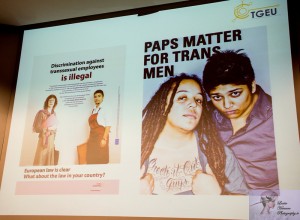
Last November was Transgender Awareness Month. It’s also been 15 years since Lydia Foy won a High Court ruling obliging the State to put a process in place to legally recognise the acquired gender of transgender people.
(They haven’t). And at the opening ceremony of the 4th European Transgender Council in DCU in early September Minister for Social Protection Joan Burton again passed the buck, committing only to ‘further dialogue’ on Ireland’s upcoming gender recognition legislation.
“Gender recognition for transgender people is a basic human right, and Ireland – one of the last EU States to legislate – has an opportunity to lead Europe in drafting inclusive, marriage-friendly legislation,” said Transgender Equality Network Ireland Director Broden Giambrone, looking at the bright side of an increasingly shameful situation. The Minster says she intends to request that the Joint Oireachtas Committee on Jobs, Social Protection and Education examine the gender recognition in the coming weeks which Broden says gives us an opportunity to change the suggested proposals so that they are more inclusive and based on self-determination. “What we would like is legislation that is in the same vein as in Argentina. They have the best practice legislation at the moment in terms of assigning trans rights and the self-determination of trans people. There are no restrictive criteria that people are forced to go through before they are able to have their gender recognized. They don’t need a medical diagnosis or medical interventions. There is no requirement for divorce or dissolution of civil partnership. In terms of process itself, it would be quick and effective.” Something that this government has proven incapable of being when it comes to people’s basic civil rights. As it stands people must be formally diagnosed with gender-identity disorder or prove they’ve had gender-reassignment surgery to a panel of predetermined ‘experts’ in order to be officially diagnosed as transgendered. More controversially the legislation proposed insists people divorce before their true gender can be recognized, proving this far from rainbow government’s belief in the sanctity of marriage is second to their belief in the sanctity of bigotry.
“The reason they are suggesting this is because Ireland does not have marriage equality. They are worried that legislation that allows you to stay in your relationship will then create a backdoor to gay marriage. They talk about how it is prohibited constitutionally but from a legal point of view you run into similar constitutional problems by forcing people to get divorced.”
It’s ironic, given how many Fine Gaelers rock back and forth on their porch, shotgun at the ready to shoot down any infringement on the special place the ‘family’ has in the constitution; they are now willing to force happily married couples into the divorce courts. The problem is, happily married couples CAN’T get a divorce in Ireland. “The requirements for divorce are quite stringent. You have to be living apart for 4-5 years. Not just living apart physically, but mentally as well. If you are happily married you can’t fulfil the living mentally apart requirement.”
While it is fair to say that the government faces its fair share of legal conundrums on the issue, Broden thinks they should look at it creatively. “If you are forced to choose between two difficult situations why don’t you choose the one that enshrines people’s human rights, that doesn’t pull families apart? Because it is such a small group of people it shouldn’t be an issue. There are other instances in Irish law where you can make an exception to the rule so people can access their rights.”
An even easier way of getting around it is to accept that the marriage was valid at the time that it was contracted. “The trans person identified with and was acknowledged as a member of the opposite sex and that should not be affected by something that happens after gender recognition.”
Zealotry aside trans people in Ireland have other things to contend with this month. By the time you read this TENI the country’s leading transgender advocacy group will have lost their core funder Atlantic Philanthropies, who are pulling out of the LGBT sector. Said support allowed TENI to professionalize their approach, forcing government departments and representatives to take them more seriously and developing a strong voice. Now relying on public funding to keep going, trans-issues run the very real risk of being ignored once again, just when they were making great strides.
“We do a lot of different work across a lot of different areas; training, workshops, advocacy in gender recognition, there is a huge scope to the work. If we don’t have funding for staff we will have to cut that down.”
A recent study by TENI and partners in the UK showed that 78 percent of transgender people in Ireland have considered suicide, while 40% had attempted suicide at least once. “It is a sad reality given how few supports there are and how low a visibility they have, that trans people face a lot of mental health challenges in this country. But when they turn to services to help with their mental health they spend so much time explaining their identities or not being referred to as the right pronouns that they end up feeling worse,” Broden concludes.
TENI have their own information line but a significant amount of calls involve suicide prevention. And while they have worked with the Samaritans, a survey of 800 health professionals in the HSE found that 90% of them had not had any trans-specific training. While most wanted it, a troubling 26% said they did not.
By Caomhan Keane



